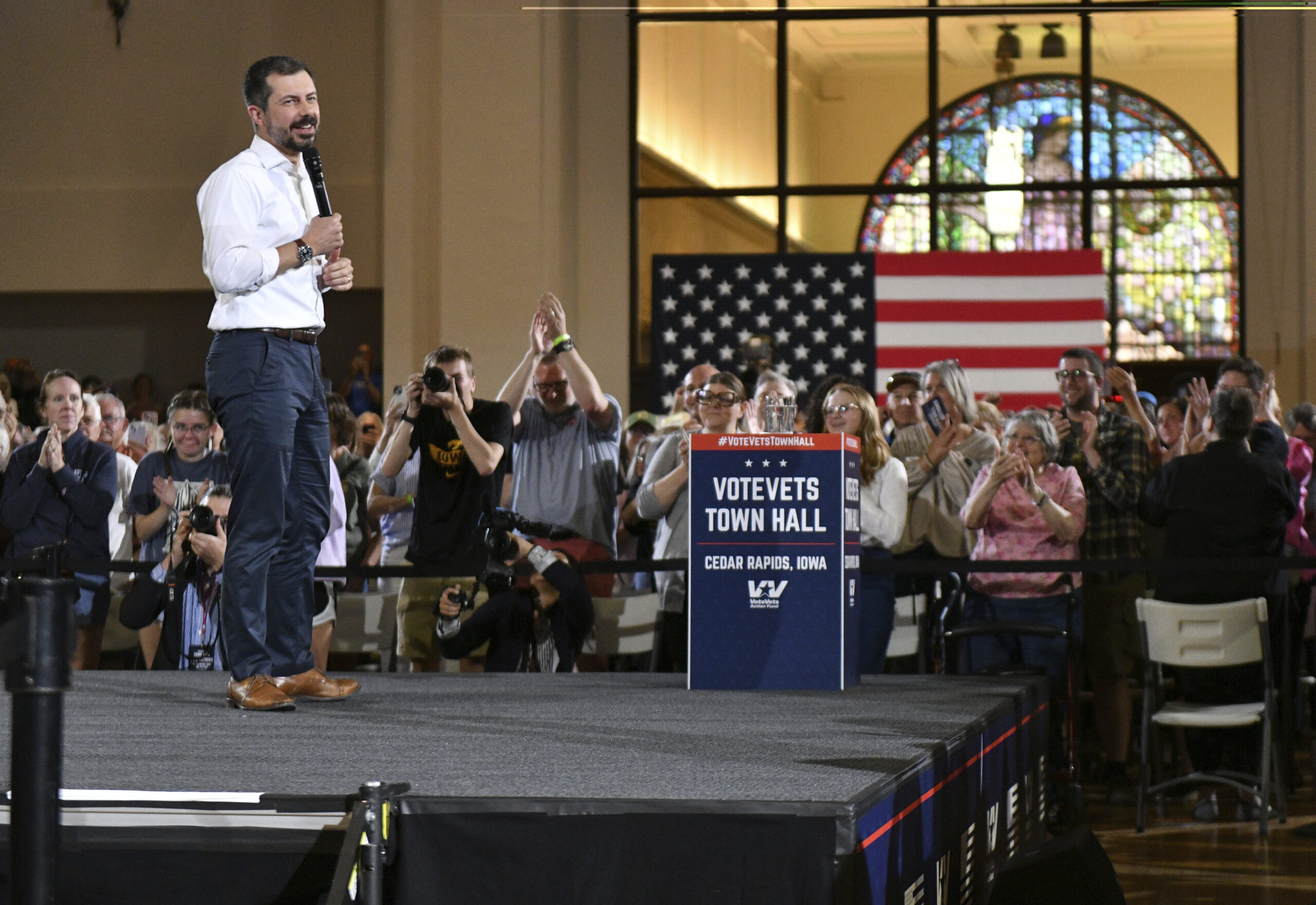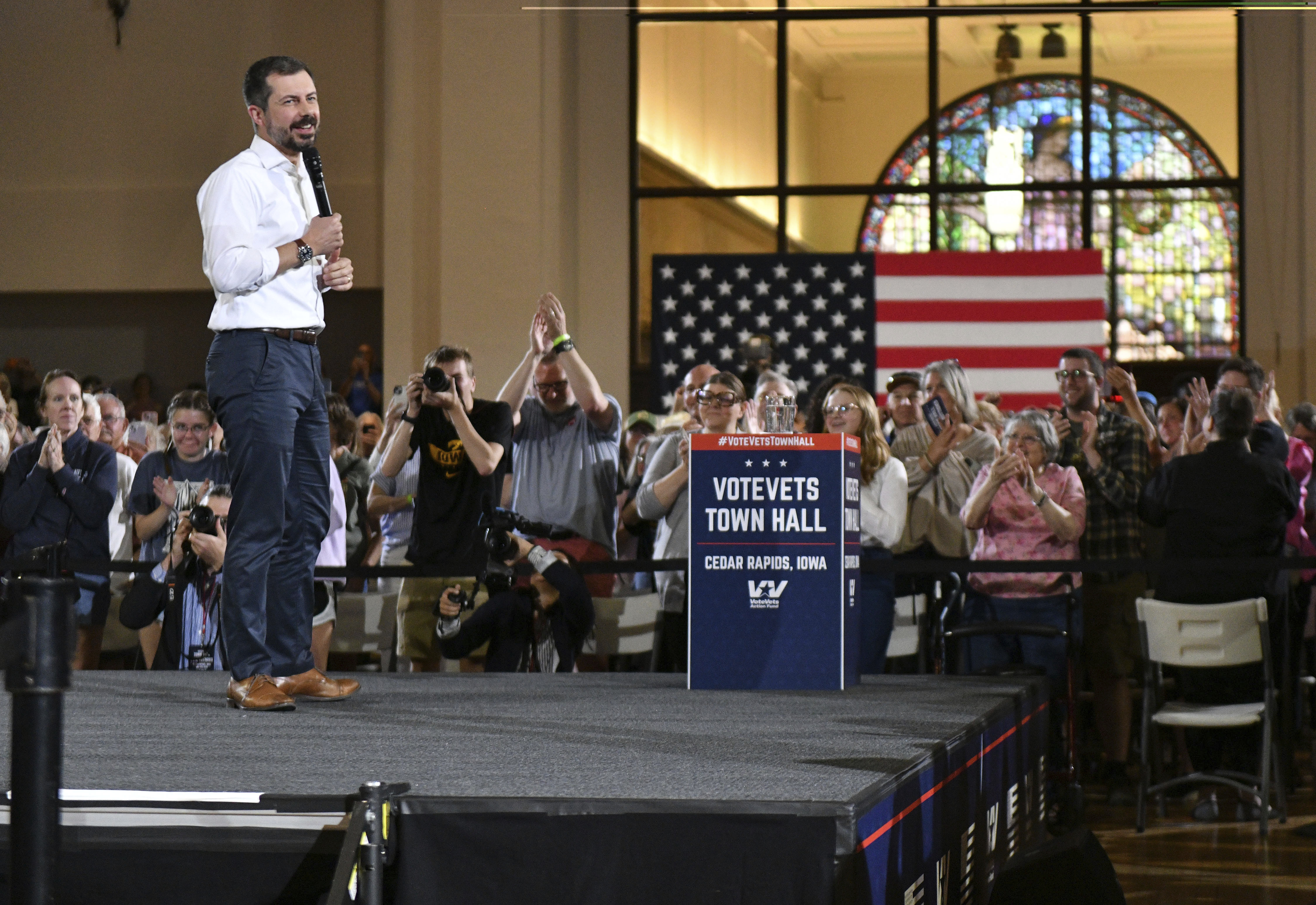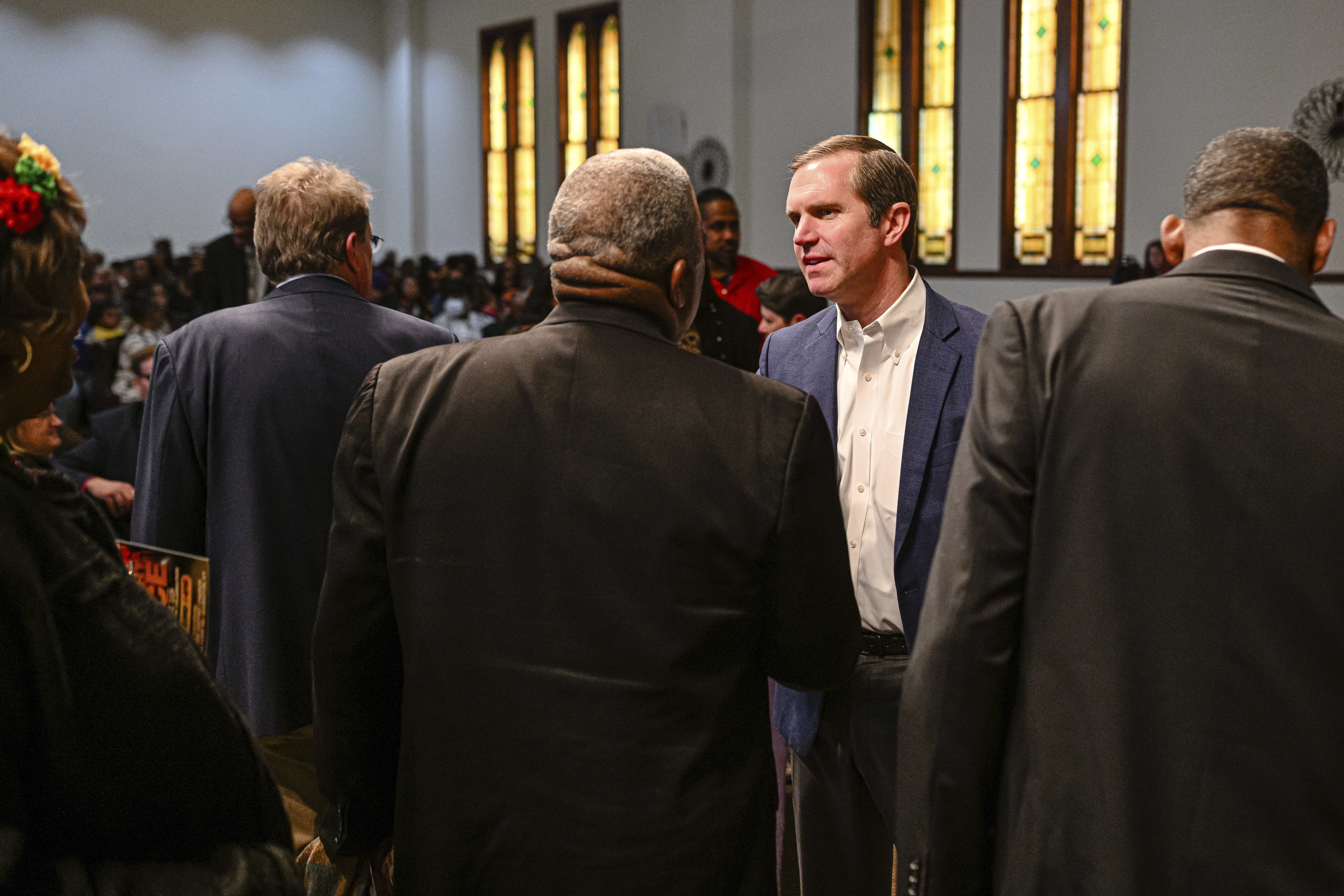Politics
How top Democrats are already gearing up for 2028 online

Several Democrats are already laying the groundwork for potential 2028 presidential runs, new campaign finance filings show, recruiting donors and running online ads that build their national profiles.
Former Transportation Secretary Pete Buttigieg led the way among Democrats talked about as presidential contenders with $1.6 million raised for his leadership PAC in the first half of the year, and a few Democratic governors raising hundreds of thousands of dollars each.
Together, they have already raised and spent millions of dollars this year, according to disclosures filed Thursday with the Federal Election Commission. The bulk of the money was spent on fundraising activities, including acquiring donor lists and running digital ads, that would facilitate a presidential run.
“If you’re thinking about running for president in 2028, job number one is being seen doing everything you can to help Democrats win in 2026, which raising money for your leadership PAC allows you to do — to travel, to test out messages, to make contributions to other candidates, to build your online following,” said Pete Giangreco, a longtime Democratic consultant who worked on Barack Obama’s presidential campaigns. “Investing in your leadership PAC money now is critical because you have to build your fundraising operation now.”

While official campaign launches are likely to come after the 2026 midterms, several rumored White House contenders have leadership PACs, which allow them to raise and spend money not tied to a particular election. The PACs linked to these potential candidates largely focused on growing their digital presences over the first half of the year, the filings show, with governors who have less of a national profile running ads online nationally and spending money to build fundraising infrastructure.
Buttigieg and Govs. Andy Beshear of Kentucky and Gretchen Whitmer of Michigan spent to acquire donor lists — a top expense for their leadership PACs. Beshear recently stumped in the early voting state of South Carolina; Whitmer appears less likely to mount a presidential bid.
List-building signals candidates’ ambitions for higher office, particularly with online fundraising a key pillar of successful Democratic campaigns over the past decade. By purchasing or renting Democratic donors’ contact information, candidates can more effectively target potential supporters, introduce themselves to a national audience and convert some of those donors into their own.
“You want to build up a strong email and text list for a few reasons — it’ll increase your name ID, you can raise money for other candidates, and then raise money for yourself,” said Mike Nellis, a Democratic digital consultant. “If you’re not spending money on growing the biggest possible audience for yourself right now, then you’re being foolish. Frankly, all of them could be spending more money on it.”
Leadership PACs also allow political figures in blue states to steer money to competitive races, including by directly donating to vulnerable candidates or state parties, or by fundraising on their behalf. California Gov. Gavin Newsom, for example, has long tapped his extensive email and text lists to raise money for other candidates. Such efforts help blue-state Democrats build relationships across the country and engender goodwill within the party.
The PACs also run ads aimed at recruiting online backers. Newsom’s leadership PAC, Campaign for Democracy, invested another $1.5 million in digital ads in late June, according to its filing. The PAC, which launched in 2023 with a major transfer from Newsom’s gubernatorial campaign, reported $4.4 million cash on hand at the end of June.
Digital advertising helps candidates expand their name recognition and recruit donors outside their home states.
“It’s the small donations from folks like you that have the greatest impact,” read one ad that Beshear’s PAC, In This Together, ran on Facebook in June. “Your support helps us do what matters most: elect decent, compassionate leaders in Kentucky and nationwide.”

Beshear’s group, which has $496,000 cash on hand, spent $30,000 on digital advertising through the end of June, according to its FEC report.
While Beshear’s PAC has run Facebook ads that predominantly target his home state of Kentucky , it has also reached an audience across the country, according to data from Meta’s digital ad library. Similarly, Facebook ads from Whitmer’s group, Fight Like Hell PAC, have predominantly targeted Michigan users — but with some national promotion, too. Hers has $2.6 million cash on hand.
Both their PAC filings reflected their home-state advantage. Among itemized donors, those giving at least $200, each got more funds from their home states than any other — despite neither Kentucky nor Michigan being hotbeds of Democratic giving.
Buttigieg’s Win the Era PAC, which was largely dormant while he served in former President Joe Biden’s cabinet, also began spending on Facebook ads in July, according to the platform. It was the first time Buttigieg had run ads on his personal page since the former South Bend mayor ended his presidential campaign in 2020.
“While my name won’t be on a ballot in 2026, I am committed to doing the work that must be done to rebuild trust in our system: supporting emerging leaders, showing up in communities we too often ignore, and helping win more elections,” read one recent ad from Buttigieg on the platform.
A person close to Buttigieg said the former secretary will continue traveling to support Democrats in 2026 and host more of his own town halls , as he did in Iowa this spring. Buttigieg, who is not in elected office, employs a small staff through his PAC, which has $2.4 million on hand.

Amanda Stitt, who led Whitmer’s 2022 campaign, said in a statement that the governor “is hard at work serving her constituents, helping to lower their costs, grow jobs, and protect their freedoms. She’s proud to support candidates throughout the country with the same goals, especially in the toughest districts like the ones she won in Michigan.”
Representatives for Beshear and Newsom declined to comment.
Leadership PACs have also covered travel and other expenses to help candidates set up 2028 bids. Beshear’s group, for example, spent $18,000 on polling in March and April.
Not all potential 2028 candidates are raising money federally right now — Govs. Josh Shapiro of Pennsylvania and Wes Moore of Maryland, both of whom are seeking reelection next year, do not have federal leadership PACs. And billionaire Illinois Gov. JB Pritzker is funding an advocacy group set up as a 501(c)(4) nonprofit that does not face stringent campaign finance reporting requirements.
Politics
Moderate Democrats change their tone on Israel
New York Rep. Ritchie Torres — one of the Democratic Party’s most ardent Zionists — has begun questioning Israel as recent images of starving Palestinian children shock leaders across the world.
Torres’ shift is slight and nuanced. Yet coming from such a vocal defender of Israel, it signifies how moderate Democrats are backing away from the unqualified support for the Jewish state that’s underscored the party for decades. And it comes as countries around the globe are reacting in horror at the famine gripping the region and reports of thousands of children dying of starvation as the Israeli military continues its offensive following Hamas’ Oct. 7 attack.
“All parties, including the U.S. and Israel, have a moral obligation to do everything in our power to ease the hardship and hunger that’s taken hold in the Gaza Strip,” Torres said in an interview last week.
He insisted his longheld defense of Israel still stands. “I feel it’s possible to be an unapologetic Zionist while at the same time recognizing there’s a crisis in Gaza and recognizing the war has poorly defined strategic objectives,” he said.
Torres is not alone in his remarks.
Throughout the country, moderate Democrats, who have long resisted pressure to reject Zionism on their left flank, are increasingly speaking out against Israel’s actions in Gaza as they react to anger among constituents ahead of the midterms next year. It’s a shift in attitude percolating from the halls of Congress to governor’s mansions. How Democrats speak about Israel is bound to be a litmus test in battleground Democratic primaries next year as the party fights to retake control of the House and pick up several Senate seats.
In recent days, a majority of Democratic senators voted for a resolution to bar the sale of assault rifles to Israeli police, a marked change in the party since the start of the military conflict. Their unprecedented rebuke comes as polling shows slipping support for Israel among Democratic voters, signaling the prolonged war has potentially caused permanent damage to the country’s relationship with the Democratic Party. And on Sunday, Sen. Tim Kaine (D-Va.) said “what’s happening now isn’t working.”
It’s a dynamic that’s also emerging on the right, as the most isolationist voices in MAGA are more forcefully condemning Israeli Prime Minister Benjamin Netanyahu and the escalating humanitarian crisis in the region.
“The facts on the ground are that militarily, they have significant tactical advantages and are sufficient enough to be able to effectively deliver food. So the question arises, why can’t you get food in there and health care services and basically follow humanitarian laws,” said Rhode Island Sen. Jack Reed, who joined 11 new Democrats in voting for the resolution from Sen. Bernie Sanders (I-Vt.) after opposing two versions only supported by a handful of progressives.
Another resolution to block the sale of heavy-grade munitions earned the support of 24 Democrats, though it failed. All Republicans opposed both resolutions brought to the floor Wednesday – but Sanders hinted GOP support may come as public opinion moves further against Netanyahu
“You’re going to see fairly soon, a number of Republicans beginning to understand that their constituents don’t want taxpayer dollars to go to an Israeli government starving children,” Sanders said.
In the interview, Torres said “all parties, including the U.S. and Israel, have a moral obligation to do everything in our power to ease the hardship and hunger that’s taken hold in the Gaza Strip.”
Torres has also tried to keep attention on the Israeli hostages held by Hamas. “The world’s silence about the deliberate starvation of Israeli hostages—at the hands of Hamas and Islamic Jihad — is as deafening as its hypocrisy,” he posted on X on Saturday. “Expect the images of emaciated Israeli bodies, starved in captivity, to appear nowhere in the pages of most major American newspapers.”
Pro-Israel donors and operatives defended Torres, with three people expressing appreciation for his continued support for Israel, while one person — who was not authorized to speak on the record — voiced concern with the frequency of his messages on social media.
“It’s precisely because Congressman Torres has been so proactive about calling out antisemitism that masquerades as antizionism that when he has constructive advice about Israel it’s listened to in a way that a statement from the member of congress who reps an adjacent district isn’t,” Stu Loeser — a New York-based consultant who represents Mike Bloomberg and a host of pro-Israel donors — said in reference to Rep. Alexandria Ocasio-Cortez.
On the GOP side, U.S. Rep. Marjorie Taylor Greene became the first Republican in Congress to describe the situation in Gaza, where more than 60,000 Palestinians have died in the conflict, a “genocide.” Prominent MAGA media figure Tucker Carlson hosted retired Green Beret Lt. Col. Tony Aguilar, who said he witnessed war crimes while working at Gaza food sites, on his show last week.
And even President Donald Trump, who has closely aligned himself with Netanyahu, implied that Israel bore primary responsibility for the situation in Gaza. A few days later, he reversed course, calling for Hamas to surrender and release hostages – deeming it “the fastest way” to end the humanitarian crisis.
“Everybody, left, right and center should react viscerally against starvation imposed by another government,” said Hawaii Sen. Brian Schatz, a Democrat. “Whatever one’s views about this war, this is beyond the pale and unacceptable, and it does nothing to make Israel safe, or Israelis safe, or Jews safe.
Hardline Israel supporter Sen. John Fetterman said Thursday he viewed the resolutions – which he opposed – as his fellow Democrats blaming Israel for the circumstances, while he blamed on Hamas and Iran. “And that explains my vote, and my ongoing support. And that’s not going to change,” he said. The Pennsylvania Democrat said he’s seen the photos of starving children circulating online, but that, “no one ever declared that it was an actual famine, to be clear.”
Some former Biden administration officials argue Netanyahu’s actions, rather than the political winds, are driving this change. They blame Netanyahu for hurting Israel’s credibility with Democrats in the United States given his aggressive military action. Former President Joe Biden, a self-described Zionist, repeatedly called for a ceasefire between Israel and Palestine, but didn’t heed calls from the left for an arms embargo.
“Yes, the political incentives for Democrats are shifting, but even more powerful for many Democrats is the recognition that a blank check approach to Israel, especially with this Israeli government, is fundamentally in contravention to our interests and values,” said Ned Price, who served as State Department spokesperson and deputy to the U.S. Ambassador to the United Nations during the Biden administration. “Bibi’s prosecution of this war has, I think, made this shift in many ways irreversible.”
A former Biden administration official, granted anonymity to speak freely about the political stakes, said a majority of Democratic senators voting to block weapons sales to Israel was unimaginable “even a few months ago” and speaks to “how badly Netanyahu has played this.” But the official cautioned this crisis is not as politically charged as was the Iraq War for many Democratic voters.
A Gallup poll released this week found approval of Israel’s military actions in Gaza had dropped to 8 percent among Democrats, the lowest rating to date. In contrast, 71 percent of Republicans said they approve of Israel’s military force in Gaza, up from 66 percent in September.
Changing public opinion on Gaza is most striking in New York, where Democratic primary voters nominated Zohran Mamdani for mayor despite millions of dollars spent attacking him for his anti-Israel posture in a heavily Jewish city. A vast majority believe Israel is committing genocide in Gaza.
Torres noted that “if there is an erosion of support for Israel in the United States, that’s not something the Israeli government should take lightly.”
Chris Coffey, a New York-based consultant and longtime Torres ally said the deepening split between the left and moderate factions of the Democratic party can be attributed to images of starving children, and criticism of Israel’s military action “was a minority view now feels like the majority view in the Democratic party.”
“When (people like) Richie Torres, who is arguably the most pro-Israel Democrat in the country and certainly in New York, are asking tough questions then it’s going to cause there to be some reflection and some ripples,” he said. “It’s going to force people to ask tough questions.”
Eric Bazail-Eimil and Joe Gould contributed reporting.
Politics
Grassley ‘offended’ by Trump’s pressure campaign on judges and U.S. attorneys
Senate Judiciary Chair Chuck Grassley said Wednesday morning he was “offended” by President Donald Trump’s attempts to pressure him to ram through more nominees coming before his panel without deference to lawmakers whose states would be affected. “Last night, I was surprised to see President Trump on Truth Social go after me and Senate Republicans over what we call the ‘blue slip,'” the Iowa Republican said at the opening of a committee business meeting…
Read More
-
Uncategorized9 months ago
Bob Good to step down as Freedom Caucus chair this week
-

 The Josh Fourrier Show9 months ago
The Josh Fourrier Show9 months agoDOOMSDAY: Trump won, now what?
-

 Politics9 months ago
Politics9 months agoWhat 7 political experts will be watching at Tuesday’s debate
-

 Politics9 months ago
Politics9 months agoHow Republicans could foil Harris’ Supreme Court plans if she’s elected
-
Economy9 months ago
Fed moves to protect weakening job market with bold rate cut
-

 Politics9 months ago
Politics9 months agoRFK Jr.’s bid to take himself off swing state ballots may scramble mail-in voting
-
Economy9 months ago
It’s still the economy: What TV ads tell us about each campaign’s closing message
-

 The Dictatorship6 months ago
The Dictatorship6 months agoPete Hegseth’s tenure at the Pentagon goes from bad to worse





